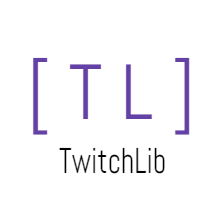TwitchLib is a powerful C# library that allows for interaction with various Twitch services. Currently supported services are: chat and whisper, API's (v3, v5, helix, undocumented, and third party), and PubSub event system. Below are the descriptions of the core components that make up TwitchLib.
- TwitchClient: Handles chat and whisper Twitch services. Complete with a suite of events that fire for virtually every piece of data received from Twitch. Helper methods also exist for replying to whispers or fetching moderator lists.
- TwitchAPI: Complete coverage of v3, v5, and Helix endpoints. The API is now a singleton class. This class allows fetching all publically accessable data as well as modify Twitch services like profiles and streams.
- TwitchPubSub: Supports all documented Twitch PubSub topics as well as a few undocumented ones.
Below are basic examples of how to utilize TwitchLib.Extension. These are C# examples, but this library can also be used in Visual Basic. This is meant to be utilized as part of a web based frontend, with that in mind the following examples are based on new Web applications built in Full framework 4.5.2 and above or dotnet core 2.0 and above.
NOTE: This documentation is currently not final, support for the Extension Library wil be done via the Twitch API - Discord server
using TwitchLib.Extension;
//There are currently two types of extension which Extend the abstract ExtensionBase class
//StaticSecretExtension & RotatedSecretExtension. StaticSecretExtension does not rotate the serect
//away from the intial secret you set. RotatedSecretExtension rotates the secret based on the time interval you set
//Twitch recommends a secret is reotated every 12 hours. More Extension types will be created in the future
StaticSecretExtension staticExtension = new StaticSecretExtension(new ExtensionConfiguration
{
Id = "{{INSERT_YOUR_EXTENSION_CLIENTID}}",
OwnerId = "{{THE_TWITCH_ID_OF_EXTENSION_OWNER}}",
VersionNumber = "{{VERSION_NUMBER_YOU_ARE_USING}}",//e.g. 0.0.1
StartingSecret = "{{YOUR_EXTENSION_SECRET}}"
});
RotatedSecretExtension rotatedExtension = new RotatedSecretExtension(new ExtensionConfiguration
{
Id = "{{INSERT_YOUR_EXTENSION_CLIENTID}}",
OwnerId = "{{THE_TWITCH_ID_OF_EXTENSION_OWNER}}",
VersionNumber = "{{VERSION_NUMBER_YOU_ARE_USING}}",//e.g. 0.0.1
StartingSecret = "{{YOUR_EXTENSION_SECRET}}"
}, 720);
//Verify a JWT
string jwt = Request.Headers["x-extension-jwt"];
ClaimsPrincipal user = extension.Verify(jwt, out var validTokenOverlay);
if (user == null) throw new Exception("Not valid");
//Creates a new secret and returns a list of the current available secrets
//It's not recommended to use this method outside of an Extension instance.
//It's recommended that a SecretHandler is created/used, we have created two for you
//StaticSecretHandler or RotatedSecretHandler you can also implement the abstract SecretHandler class
var secrets = await extension.CreateExtensionSecretAsync();
//Gets the current secret from the Extensions secret handler
var currentSecret = extension.GetCurrentSecret();
//Gets the current list of secrets for the Extension from twitch
secrets = await extension.GetExtensionSecretAsync();
//FOR EMERGENCY USE ONLY - deletes all extension secrets from twitch, your extension will no longer work
var complete = await extension.RevokeExtensionSecretAsync();
var channels = await extension.GetLiveChannelsWithExtensionActivatedAsync(null);
var channelId = "{{BROADCASTER_CHANNEL_ID}}"; //the channel id can be received from the current verified user principal;
//var channelId = user.Claims.FirstOrDefault(y => y.Type == "channel_id").Value
//Within your extension version management -> Extension Capabilities -> Required Configurations
//When a braodcaster has "setup" the extension to your liking and it requires no further mandatory config
//send the channelId and the string set in you version settings to signify this to twitch
complete = await extension.SetExtensionRequiredConfigurationAsync(channelId, "{{WHATEVER_STRING_YOU_SET_IN_VERSION_MANAGEMENT}}");
//Within your extension version management -> Extension Capabilities -> Required Broadcaster Abilities
//An OAuth process may occur, set your scopes in this section under Version Management
//The broadcaster will go through the OAuth process set your Oauth callback in
//Extension -> Settings-> General -> OAuth Redirect URI
//Then follow the standard/twitch procedure to get an access_token
//when complete pass true or when failed pass false using the method below
complete = await extension.SetExtensionBroadcasterOAuthReceiptAsync(channelId, false);
//You can send pubsub messages to your extension
//see the twitch example for receiving these message
//the below method send the message
//It is up to you to determine permisions to send messages, the EBS or the current user can send messages
//check https://dev.twitch.tv/docs/extensions/reference#jwt-schema (pubsub_perms) for more info
//if a jwt is not passed it creates one based on the EBS sending the message
complete = await extension.SendExtensionPubSubMessageAsync(channelId, new TwitchLib.Extension.Models.ExtensionPubSubRequest {
Content_Type = "application/json",
Targets = [ "broadcast"],
Message = "{\"foo\":\"bar\"}"
});
There is currently additional support for .Net core.
using TwitchLib.Extension;
using TwitchLib.Extension.Core.Authentication;
using TwitchLib.Extension.Core.ExtensionsManager;
public void ConfigureServices(IServiceCollection services)
{
.....
services.AddAuthentication(options =>
{
/*Options removed for space*/
})
.AddTwitchExtensionAuth();//<---- this is the bit you're after
services.AddAuthorization(options =>
{
options.AddPolicy("{{CREATE_A_POLICY_NAME}}",
policy => policy.RequireClaim("extension_id",
"{{INSERT_YOUR_EXTENSION_CLIENTID}}",
"{{INSERT_YOUR_EXTENSION_CLIENTID2}}",
)
);
});
//Add the extension manager functionality
services.AddTwitchExtensionManager();
.....
}
public void Configure(IApplicationBuilder app, IHostingEnvironment env, IServiceProvider serviceProvider)
{
.....
//This allows for multiple extensions.
app.UseTwitchExtensionManager(serviceProvider, new Dictionary<string, ExtensionBase>
{
{
"{{INSERT_YOUR_EXTENSION_CLIENTID}}",
new StaticSecretExtension( new ExtensionConfiguration {
Id = "{{INSERT_YOUR_EXTENSION_CLIENTID}}",
OwnerId= "{{THE_TWITCH_ID_OF_EXTENSION_OWNER}}",
VersionNumber ="{{VERSION_NUMBER_YOU_ARE_USING}}",//e.g. 0.0.1
SecretHandler = new StaticSecretHandler("{{YOUR_EXTENSION_SECRET}}")
})
},
{
"{{INSERT_YOUR_EXTENSION_CLIENTID2}}",
new StaticSecretExtension( new ExtensionConfiguration {
Id = "{{INSERT_YOUR_EXTENSION_CLIENTID2}}",
OwnerId= "{{THE_TWITCH_ID_OF_EXTENSION_OWNER2}}",
VersionNumber ="{{VERSION_NUMBER_YOU_ARE_USING2}}",//e.g. 0.0.1
SecretHandler = new StaticSecretHandler("{{YOUR_EXTENSION_SECRET2}}")
})
}
});
.....
}[Produces("application/json")]
[Route("api/[Controller]")]
[Authorize(AuthenticationSchemes = "TwitchExtensionAuth", Policy ="{{ENTER_THE_POLICY_USED_AT_STARTUP}}")]
public class ExampleController : Controller
{
private readonly ExtensionManager _extensionManager;
public ExampleController(ExtensionManager extensionManager)
{
_extensionManager = extensionManager;
}
[HttpGet]
[Route("[Action]")]
public async Task<PuzzleResultModel> Puzzle()
{
//as you added the AddTwitchExtensionAuth in Startup and Authorize attribute on the controller the user is Authenticated and Authorized for you
var user = User;
//User Id - if user is not null but user_id is the user has not given permision to share their user_id
user.Claims.FirstOrDefault(y => y.Type == "user_id")
//Channel Id
user.Claims.FirstOrDefault(y => y.Type == "channel_id")
//Extension Id - This is added at Authorization and is the client id of the extension you were authorized against (if you have multiple extensions)
user.Claims.FirstOrDefault(y => y.Type == "extension_id")
//Other Claims - "exp", "opaque_user_id", "role", "pubsub_perms"
var extensionId = user.Claims.FirstOrDefault(y => y.Type == "extension_id").Value;
//call an extension method
_extensionManager.GetExtension(extensionId).GetCurrentSecret(); //All Extension API methods available
}
}
